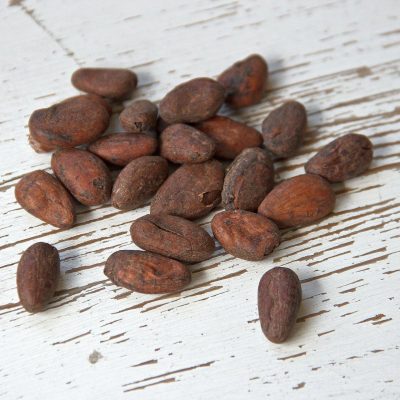Wellbeing

Nutritionist Cassandra Barns gives the low-down on the many minerals found in cacao:
What do you think are the most nutritious foods you can eat? Kale? Blueberries? Chia seeds? Liver? These are certainly nutrient-dense foods, with lots of health benefits. But another food is up there with them: cacao, the raw ingredient used to make chocolate. So if you thought all chocolate was unhealthy, think again!
What is cacao?
Cacao is the raw version of cocoa, which comes from the beans of the Theobroma Cacao plant (cocoa beans). To make a standard chocolate bar, it’s roasted and processed – and often mixed with plenty of sugar, milk and other additives. But in its raw form, either as a pure powder or in a raw chocolate bar, it’s a true whole food that’s rich in nutrients and beneficial plant compounds.One of the features that makes cacao so special is its amazing mineral content.
Why are the minerals in cacao so important?
Despite our best efforts, it can be difficult for many of us to make sure we’re getting enough of the minerals we need from our normal daily diet. Eating whole foods rather than processed foods and eating plenty of vegetables are vital steps. But even then, factors such as depletion of minerals from our soils can leave us short, especially in magnesium. So cacao could actually be the key to helping us optimise our nutrient intake from our foods without having to resort to a multivitamin and mineral supplement!
So let’s have a look at some of the essential minerals we can get from cacao.
Magnesium
As we’ve seen, magnesium may be difficult to get in adequate amounts from our diet. It’s vital for over 300 different chemical reactions that happen millions of times in our body every day. It plays an important role in our cells’ ability to make energy from our food – and so lack of magnesium can be a cause of fatigue and low energy. It’s crucial for our muscles to work properly to allow us to move, and for nerve signals to be transmitted around the body and brain. And magnesium is also important for our bones, and needs to be in balance with calcium and other minerals for this purpose.
This miracle mineral is also commonly described as ‘nature’s tranquiliser’. This is because it plays a role in allowing our muscles to relax; and also because it may help us to cope with stress, moderating the body’s release of stress hormones such as adrenaline. What’s more, being under a lot of stress may cause our body to use up magnesium more quickly, and so it’s doubly important to get enough at this time.
Pure cacao or cocoa (the roasted version) may contain as much as 499mg of magnesium per 100g*, which is more than 130% of our recommended daily intake. So a 35g chocolate bar containing 90% cacao could provide up to 40% of our recommended intake. What better excuse to eat chocolate when you’re stressed! Just make sure it has a decent amount of cacao and minimal sugar – or only unrefined sugar such as coconut sugar.
Iron
As you’re probably aware, iron is vital for making haemoglobin to carry oxygen around the body. It also plays a vital role in immunity, and for cognitive function (memory, thinking, reasoning, etc.) and, like magnesium, is also essential for converting food into energy and preventing fatigue. It can be particularly common for vegetarians and vegans to be lacking in iron, because meat – red meat in particular – is one of the best sources of this mineral.
Plant sources of iron include green vegetables, nuts and seeds, and some dried fruits. But one of the best plant sources is actually – you guessed it – cacao! Taking the same example of a 35g chocolate bar containing 90% cacao, eating one bar could provide you with up to 4.4mg of iron*, equating to about 30% of our recommended daily intake.
Potassium
Our body uses up a lot of potassium every day; we need far more of it than we need calcium or magnesium. It helps to maintain the right fluid balance in the body, it keeps our blood pressure stable and, like magnesium, it’s required for muscle function and for nerve signals to travel around the body. Potassium has to be in a good balance with sodium for all these things to happen, and for overall good health.
If we’re eating a lot of vegetables and fruit and limiting intake of processed foods, then getting enough potassium in relation to sodium is unlikely to be a challenge. But for those who eat more processed or convenience foods – from ready meals, to biscuits, to breakfast cereals – and potentially add salt to foods too, it can be more difficult to balance out the high sodium intake from these foods with enough potassium. Together with replacing processed foods with more whole foods and watching salt intake, eating high-cacao chocolate can help to improve this ratio. Around 75% of our recommended intake of potassium is provided per 100g of cacao (1524mg*), or around 25% in one 90%-cacao chocolate bar.
Zinc
Also worth mentioning is zinc, which is vital for our immune system, bone health, healing, and for good hormone balance and fertility. Cacao can provide around 20% of our recommended amount of zinc in that one 35g chocolate bar*. Other good sources of zinc are oysters, meat, seafood, and pumpkin seeds, which are all highly nutritious foods too (although not as much fun as chocolate!).
* “Cocoa, Dry Powder, Unsweetened Nutrition Facts & Calories". Nutritiondata.self.com. N.p., 2016. Web. 16 Sept. 2016.

